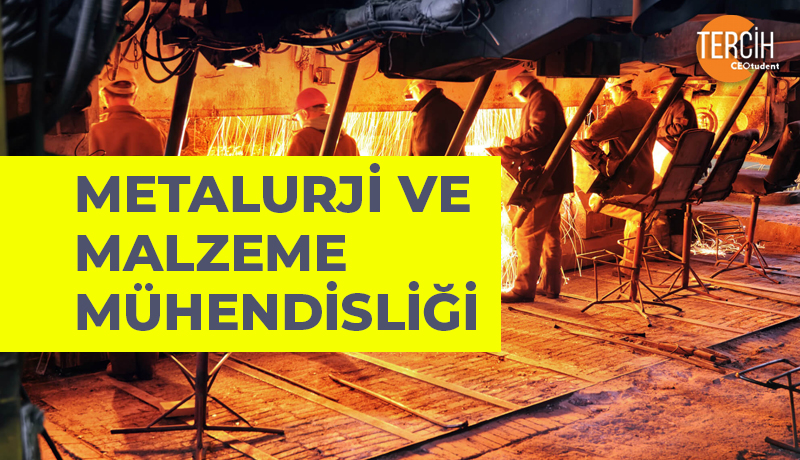Metallurgical and Materials Engineering started to give education under the name of Metallurgical Engineering within the body of Istanbul Technical University Mining Faculty for the first time in our country. As of 2012, this department provides education in approximately 25 universities in our country. We have compiled all the questions about the episode for you.
What is the Department of Metallurgical and Materials Engineering?

We can examine the Metallurgical and Materials Engineering department under the headings of metallurgy and materials. Materials science examines the internal structure of materials and the behavior of materials due to these internal structures and the processes that lead to the formation of these structures. Metallurgy, on the other hand, is the part of the science of materials specialized in metals. It deals with metals and alloys in general.
How Many Years is the Education Period of the Department of Metallurgical and Materials Engineering?
The department is a 4-year training program. Like other engineering branches, they take basic science courses in their first year.
What are the Courses of the Department of Metallurgical and Materials Engineering?
The main courses taken in the department are:
● Introduction to Materials Science
● Mathematics
● Physics
● Thermodynamics
● Phase Diagrams
● Characterization
● Phase Transformations
● Chemical Properties of Materials
● Physical Foundations of Materials
● Material Modeling and Simulation
● Ceramic Materials
● Polymer Materials
● Electronic, Magnetic and Optical Properties of Materials
● Material Process Laboratories
● Mathematics
● Physics
● Thermodynamics
● Phase Diagrams
● Characterization
● Phase Transformations
● Chemical Properties of Materials
● Physical Foundations of Materials
● Material Modeling and Simulation
● Ceramic Materials
● Polymer Materials
● Electronic, Magnetic and Optical Properties of Materials
● Material Process Laboratories
What Do Metallurgical and Materials Engineering Graduates Do?
Metallurgical and Materials Engineering departments can work in different sectors according to the fields they specialize in. Its main fields of work are iron and steel, casting, defense, automotive, aviation and space industry and chemical industry. Apart from these areas, wherever there is industry, there is a job for graduates of the department.
How Much Salary Do Metallurgical and Materials Engineering Graduates Get?
If the graduates of the department want to start a job in the defense industry, their starting salary is around 8,000 TL. However, it may vary according to the cities and sectors they want to work in. If an average Metallurgical and Materials engineering graduate wants to start a job in the iron-steel and casting industry, the starting salary is between 4,000 TL and 5,000 TL.
What are the Challenges of the Metallurgical and Materials Engineering Department?
If you are a female Metallurgical and Materials Engineer, the main challenge you will face is gender discrimination. Because in the main sectors we have mentioned, there is a male majority in both blue and white collar workers. Gender discrimination, which dominates the society in general, will also show itself here. Apart from this, if you have studied English, it will be a great difficulty not to know the Turkish of metallurgical terms. In addition, iron-steel and casting industries are challenging areas in terms of working conditions. Working areas can be physically and mentally challenging as they are factories. You need to be aware that you will spend a lot of time commuting, as industrial areas are often outside the city.
Who Can Succeed in Metallurgical and Materials Engineering?
Individuals who like to wonder and question, who love to research and learn can be successful in this department. Students who want to study in this department, whose purpose is to investigate the internal structure of the substance, are asked “How?” for each item. should answer the question.
What are the Job Opportunities of the Metallurgical and Materials Engineering Department?
The department has very wide job opportunities. Especially in our country, huge investments are made in the defense industry. As materials science studies materials in all areas of life, Metallurgical and Materials Engineers will be needed as production continues.
What are the Foreign Opportunities of the Metallurgical and Materials Engineering Department?
Materials science is considered the most important branch of science today all over the world, especially in the USA. For this reason, it is quite possible to find a job both as a researcher and depending on the production dynamics of the desired country.
In Which Fields Can Metallurgical and Materials Engineering Graduates Specialize?
They can specialize in areas such as nanotechnology, biomaterials, composites, ceramic materials and armor materials, renewable energy, modeling and simulation, wearable technologies, rocket technologies, coating technologies, steel, damage analysis, non-destructive testing and welding technologies. During the undergraduate process, they can decide on the area they want to specialize in and take courses related to that area.
What is the Future of Metallurgical and Materials Engineering Department?
As the search for alternative materials to existing materials in the world continues, the importance of materials science is increasing. Since understanding the physical and chemical properties of materials is very important in terms of meeting production needs, the task of metallurgical and materials engineers and materials scientists is increasing. The future of metallurgical and material engineers will be bright until the end of the world, as long as there is a need for production and the energy required for this production.
All other university departments from here you can reach.















